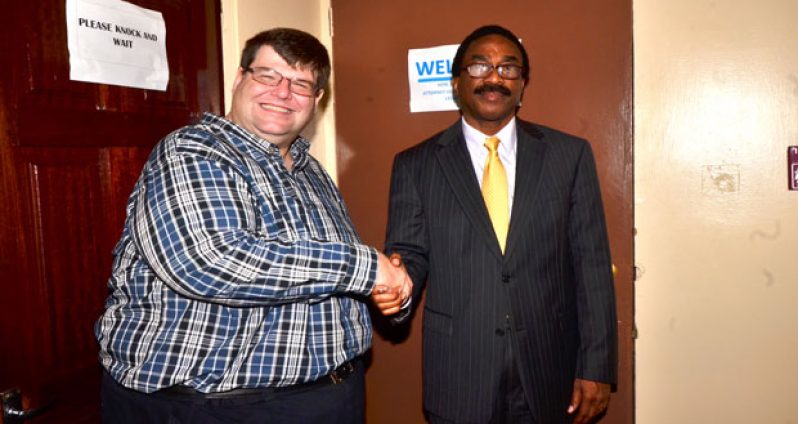SUBSEQUENT to a courtesy call by U.S. Charge d’Affaires, Bryan Hunt to Attorney General and Legal Affairs Minister Basil Williams yesterday, Hunt told reporters the two countries will work closer on “improving criminal justice and bringing to account those who are guilty of crimes.” Addressing the importance of Guyana’s pending money- laundering legislation, the senior US embassy official expressed confidence that Parliament will approve the legislation by the September deadline, since it has been in limbo for years.
“We fully support the Government in that objective. It’s going to be very important that the legislation is passed by the September deadline for submission to the Financial Action Task Force before its October meeting,” Hunt said.
Hunt expressed optimism about the current format and structure of the bill as he said “[It] has been reviewed by a number of international bodies.” He continued, “if the bill were to be passed in its current form, then it would be fully compliant with the recommendations that have been put forward by the Caribbean Financial Action Task Force [CFATF], and the global Financial Action Task Force.” [FATF].
Increased DEA presence
As an aside, Hunt was asked whether passage of the legislation would aid the U.S Drug Enforcement Administration (DEA) in its assistance to local authorities. He responded directly, but hinted to greater collaboration between the two countries under the Caribbean Basin Security Initiative (CBSI).
Hunt did say however that the DEA will be seeking out more permanent personnel for its operations in Guyana, since the unit operated previously out of Trinidad and Tobago.
“The DEA, at this stage, is in the process of identifying full-time personnel to be here over longer periods of time,” said Hunt, while adding the local agencies to benefit from greater collaboration and training under the CBSI are the Customs Anti-Narcotics Unit (CANU) and the Serious Organised Crime Unit (SOCU).
Hunt acknowledged a noticeable reduction in drug seizures within the country as of recent and he linked this to the work done by the DEA with local authorities. “I think it’s fair to say that since the DEA began their operations here, we’ve certainly seen a significant uptick in the number of seizures that have happened in airports,” Hunt told reporters yesterday.
US-Guyana Extradition
On the question of extradition of criminal offenders from Guyana to be tried in the U.S, Hunt said there is currently a long-standing extradition treaty between Guyana and the U.S which goes back to Guyana’s colonial past.
That treaty, according to Hunt, could see some revisions in the future to “enhance the effectiveness of the agreement, but those would not be rushed, since “the Government would have to look at what’s feasible under Guyanese law, [and] our lawyers would need to look at what’s feasible under U.S. law.”
Hunt later explained that there might not be any drastic changes to the agreement between the two countries, but simply a revision of “procedures relating to how we handle requests on the two sides.”
Williams, Hunt talk criminal justice improvements
SHARE THIS ARTICLE :
Facebook
Twitter
WhatsApp


.jpg)











